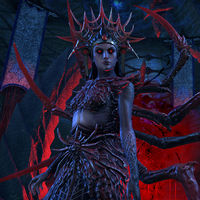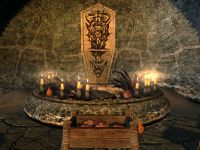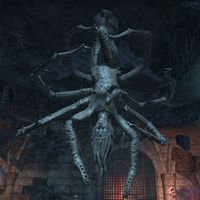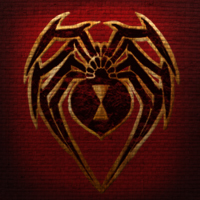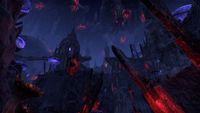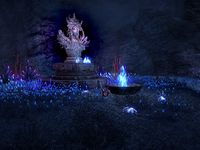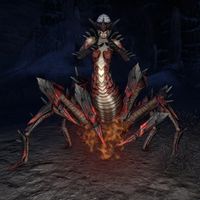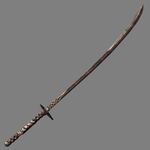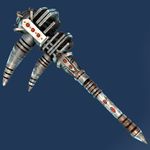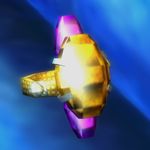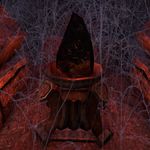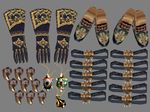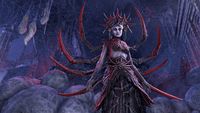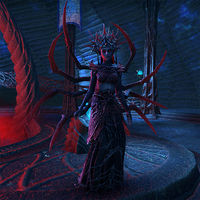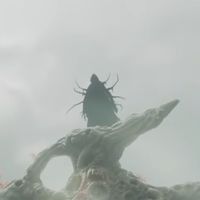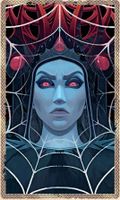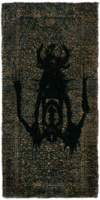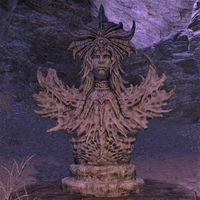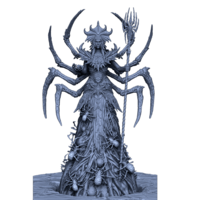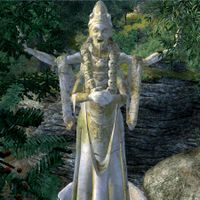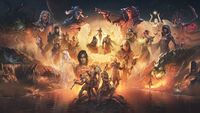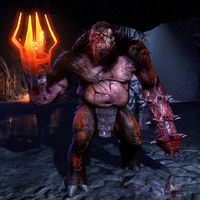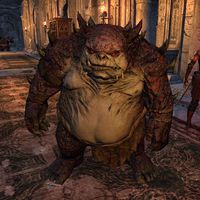Lore:Mephala
Mephala is a Daedric Prince who is associated with murder, lies, deception,[1] sex, and secrets, and is always weaving a web of intrigue and terror.[2] Though it is stated that her sphere is obscured to mortals.[3] Mephala is also known as the Webspinner,[4] Plot-Weaver,[5]:211 Androgyne,[6] the Spinner,[7][8] the Spider, the Teacher of the Secret Arts, the Queen of the Eight Shadows of Murder,[9] the Silver Spider,[10][11] the Spider Queen,[12] the Spider God,[13] the Dark One,[14] the Whispering Lady,[15][16] the Lady of Whispers,[17] and the Queen of Oblivion.[18] She is also referred to as the princess of secrets and she who weaves the sordid web of human affairs.[19] Long, thin silver hair is a trait associated with Mephala's champions.[20]
Mephala interferes in the affairs of mortals for her own amusement,[21][22] and does nothing without purpose.[4] Mephala thinks of the affairs of mortals as a weave;[17] pull but one thread and the whole thing unravels.[23] To her, the "web" of the Aurbis is an interconnected system of action and consequence, and she spins new threads to influence outcomes. In an essay analyzing the Daedric Prince, Divayth Fyr posits that Mephala likely doesn't see mortals as mere playthings, unlike some of her fellow Princes.[4]
The Webspinner deals in secrets and hidden lore.[24] She and her worshippers value secrets and mysteries above all else.[25] Those who stumble upon one of Mephala's shrines or a place where an artifact of hers is hidden may find Mephala whispering forbidden secrets in their ears.[26][16] Hermaeus Mora, the "Demon of Knowledge", is sometimes referred to as Mephala's sibling.[6] Hermaeus Mora collects knowledge of all sorts, but Mephala cares only about knowledge that is obscure and undisclosed.[25] Not only is she secretive, Mephala also cares very little for the safety and well-being of mortals. The Spider takes great pleasure in strife. A ruined marriage, two peaceful factions erupting into bloody warfare over falsified evidence of treachery ... she finds all of these amusing.[23][17]
Mephala is purportedly one of the "strongest of the recognizable spirits" that emerged soon after Akatosh formed and time began.[27] Mephala's enemies include Ebonarm and Peryite. She was allied with Malacath at one point prior to the Warp in the West.[28] The ancient Khajiit considered her an ally to Azurah, Boethra, and Lorkhaj. They also believed that she was Boethra's lover.[29] Her summoning day coincides with the Witches Festival, which falls on the 13th of Frostfall.[30]
Religion and Culture[edit]
—Vivec and Mephala
In Morrowind, Mephala is the ancestor spirit that taught the Chimer the skills they would need to evade their enemies or to kill them with secret murder. Enemies were numerous in those days since the Chimer were a small faction.[31] Mephala, along with Boethiah, organized the clan systems that eventually became the basis for the Great Houses.[6] Chimer shrines to Mephala were referred to as "Mephala's Nests".[32]
Some versions of the tale of Trinimac's fall claim that Mephala was an integral part of his transformation. In one such iteration of the story, Trinimac battles Boethiah for turning the Velothi against their Aedric ancestors, and is stabbed in the back by Mephala just as he's about to deal a major blow. Trinimac was too wounded to fight further, allowing Boethiah to disfigure him and cast the disgraced god into Oblivion. Trinimac tore the shame of failure from his chest, which created Mauloch.[33]
Mephala is one of the "Good Daedra" of the Tribunal faith.[34][35] She is known as Black Hands Mephala[36] and the Anticipation of Vivec.[37] She is various and many, and is androgynous.[31] Vivec was touted by the Tribunal Temple as a transcendent evolution of Mephala. The darker themes connecting Vivec to Mephala are not recorded in popular liturgy, but they were understood and accepted by adherents of the faith as important to Vivec's divine identity.[37] It was understood that Vivec had an unnatural attraction to lustful thoughts and murderous intentions.[38] Vivec was compassionate and protective of his people, who hailed him as their benevolent guardian. Undercurrents of violence, lust and conspiracy were present in the Dunmer's perception of him nonetheless.[37]
Vivec's religious profile is awash in duality, as is befitting his relation to Mephala. One cultural relic that reflects this is the persistent myth that Vivec conspired with Sotha Sil and Almalexia to murder Lord Nerevar. The notion was born from Ashlander oral tradition, and was contradicted by the Tribunal Temple's teachings. True or not, the tale was firmly established in Dunmer society. This myth presents a darker facet of Vivec's persona for his followers to ponder, one that is tied to his association with Mephala, who embodies conspiracy, secrets and murder.[37]
To the Khajiit, she is known as Mafala.[39] They also called her the Teaching Mother, the Elder Spirit, the Keeper of the Ancient Secrets of Fadomai,[29] the Clan Mother of Dark Secrets,[40][41] and the Eight-Clawed. Ancient sermons claim that she served as the recorder of hidden guilt and eternal shame. She was considered an ancestor spirit and a teacher of the old ways;[39] however, her worship fell out of favor after the event known as the "Sinner Suicides".[40] Mafala, along with Azurah and Boethra, are said to be the only ones capable of summoning an obscure spirit of vengeance, as only they know its true name. The spirit appears as a black panther, a warrior in ebony armor, or a hidden sword.[42]
The Orcs of the Morkul Clan once revered Mephala. As with most of Mephala's cults, they called spiders her "children". The clan ritualistically sacrificed people to power their clan's Blood Forge in her name.[11]
Association with Assassins[edit]
Mephala directly helped to found the infamous cult/society of the Morag Tong, and they claim to murder for the Daedra's glory. Some scholars also argue that when the Morag Tong was banished from the rest of Tamriel, they were allowed to continue to operate in Morrowind when they replaced their worship of Mephala with that of Vivec. As a reaction to this, the Dark Brotherhood was formed, being led by the mysterious Night Mother, who some insist is just another form of Mephala.[43] Prior to the Warp in the West, the branch of the Dark Brotherhood that operated in the Iliac Bay openly worshipped Mephala.[18] Some within the organization recognize her role, although it has become obscure over time.[44]
Mephala was the patron of the Silken Ring, a group of assassins comprised of deserters from the Dark Brotherhood, the Morag Tong, and the Shadowscales. The group was led by Dranos Velador, a former member of the Morag Tong, and the Lady of Lace, a hoarvor Daedra devoted to Mephala.[45] The Lady of Lace granted the Silken Ring Mephala's blessings, which made them deadlier assassins.[46] The Silken Ring believed the Brotherhood and the Shadowscales did not understand Sithis's true nature, but Mephala does.[47] The organization's founder felt the Morag Tong merely paid lip service to Mephala. With the Silken Ring's founding, he felt he would be doing her bidding directly.[48]
Worship[edit]
Gardeners may occasionally ask Mephala to spare their gardens from slugs and worms due to her association with spiders.[49] Spiders and related imagery (such as webs) are often used in devotional pieces to Mephala.[26][50][51] Pieces are often made from silvery or solid-black materials, such as ebony or hematite.[52] Textiles created in Mephala's honor are usually woven from spider silk.[13]
The Cult of the Spider (also called the "Spider Cult") is an illegal form of worship that honors Mephala. individual spider cults are sometimes referred to as "Webs". People generally don't purposefully seek to join the cult. As one of its members described it during an interview in the Second Era, the weaving of Mephala's web draws people into their service. That is not to say Mephala recruited them; rather, the cultists believe that their involvement in the cult is as inevitable as death itself. The Spider Cult has a leader known as the Widow, who communes with Mephala and grants duties to subordinate members. Sometimes, Mephala wants someone dead; these jobs fall to the Deathweavers. The rest of the cult consists of Scuttlers, who perform more discreet tasks to spin their master's webs.
The Spider Cults use sex and seduction as tools, and induction into the cult often requires prospective members to engage in such activities with the Widow or another designated party. Some Webs are more zealous about this than others. The cult's use of sex has earned them a reputation for being "debauched orgy clubs", a claim that is mostly inaccurate.[53] Some spider cults execute members who express doubt in their faith to Mephala.[14] Spider cults often keep giant spiders, which they feed live mortals; one who intrudes upon a spider cult's domain may find themselves a meal to the sect's eight-legged pets. Those who are faithful to Mephala are able to command spiders,[54] which are surprisingly easy to train.[55]
Followers who worship at Mephala's shrine in Cyrodiil's Great Forest leave offerings of nightshade at the shrine between midnight and dawn if they seek an audience with the Prince.[21]
A seemingly universal concept among Mephala's worshippers is a simple mantra, referred to by one Morkul cultist as "Her whispers": "Lust is love. Lies are truth. Death is life."[20][26]
As of the Fourth Era, some Reachfolk cults of Mephala were active.[56]
History[edit]
Earliest Interactions[edit]
Rajhin stole the Ring of Khajiiti from Mafala prior to his ascension to godhood. During this period in Elsweyr's history, there was no such thing as a Mane.[57] The moons were new on the night of the crime, thus shined no light upon Nirn. The darkness gave Rajhin access to Oblivion, where he found Mafala, Azurah, and a third Daedric Prince arguing over who claimed dominion over the night. Rajhin listened to their argument for a while before revealing his presence. He offered to settle their debate, as there is no one more familiar with the night than a thief. At first, Mephala regarded Rajhin with malice, and sought to eat him. However, Azurah stopped her. Each Prince told Rajhin why they deserved to be chosen, and the thief caught sight of the Ring of Khajiiti on Mephala's eighth arm. He seduced Mafala by appealing to her vanity, and stole the ring off her arm while they made love.[58] He spotted the Ebony Blade as he was leaving, and made off with both artifacts.[59] Rajhin used the Ring of Khajiiti's powers to make himself as invisible, silent, and quick as a breath of wind. Using the Ring, he became the most successful burglar in the history of Elsweyr, eventually being elevated to the Thief God of the Khajiit.[59]
Long ago, the Ayleid city of Erokii thrived in Rivenspire. It was ruled by princess Anurraame, whose wisdom, grace, and beauty were unsurpassed. She married a prince from another state, and their relationship was happy for a time. However, Anurraame's husband was away for extended periods of time. The princess's passion died, and she took a younger warrior as her lover. Her husband eventually caught wind of the affair, and gathered his army to storm the city. Anurraame pledged to face him in battle, and her lover promised to muster his own forces in defense of the city. When the day of the battle arrived, Anurraame saw that her lover had betrayed her for a bribe, as his legions had joined her husband's. The spurned princess called upon the Daedra to help defend her city, and Mephala answered her plea. She commanded Anurraame to pour all her tears in a basin, then imbued them with the power of Anurraame's hatred for her traitorous lover, which was only strengthened by the genuine love she had for him before he turned on her. Her tears hardened into a powerful artifact known as the Tears of Anurraame, which the princess used to destroy both armies and her city in the blink of an eye.[60]
Second Era[edit]
Some time in the early Second Era, an Altmer named Nerien'eth uncovered the Ebony Blade while scouring Tamriel for artifacts to study. He brought it to his school of magic, Agea Relle for study, believing it to be an ancient Akaviri blade.[61] Mephala whispered to Nerien'eth through the blade, and gradually corrupted his mind.[62] Mephala convinced him that his wife, Alanwe, was having an affair with one of her fellow instructors at Agea Relle.[63][64] Eventually Nerien'eth snapped and ensnared the souls of his students and fellow researchers. He summoned Daedra to torture their souls for eternity, and shattered Alanwe's soul so that she would suffer the most.[65] Mephala was greatly pleased by Nerien'eth's murder of so many who loved and trusted him, and so petitioned the Mad Architect to construct elaborate instruments of torture from the remnants of the academy.[15] Agea Relle became known as the Crypt of Hearts, and was avoided by the people of Rivenspire for many years.[66] In 2E 582, a group of Undaunted entered the Crypt and cleared it of undead and Daedra, freeing the captured souls and restoring Alanwe's spirit.[67]
Instead of departing for the afterlife, Alanwe stayed behind to protect the vault from Nerien'eth, who returned in force later that year. Using the Ebony Blade, Nerien'eth summoned minions of Mephala, powerful Daedra who aided him in recapturing the lost souls.[68] The Undaunted returned, and once again aided Alanwe by investigating Nerien'eth's return. The group managed to locate the Ebony Blade, and were forced to slay Nerien'eth when he wielded it in battle. Alanwe's spirit then took the blade and communed with Mephala, the unknown whisperer. Mephala attempted to corrupt her by promising to help destroy the weapon, but Alanwe refused to listen to the Prince. Instead, she used her own soul to place a charm on it so that it would never remain with an individual for long. She then sent it far away, although the blade was fully empowered at the time and fought against her will, yearning to eventually return home. However, Alanwe's sacrifice did deny Mephala the blade's use during a great war between the forces of Oblivion.[69]
A lost temple to Mephala was uncovered by the Falinesti Faithful at the lost city's autumn resting site. The Prince took advantage of the faithfuls' yearning for answers and purpose, and spoke to them. They formed the Arbordawn Cult and became her Deathweavers. Assisted by a hero, acclaimed mage Telenger the Artificer unsealed the temple and encountered Mephala within during their investigation.[70] Telenger promptly resealed the temple to prevent Mephala's influence from escaping.[71]
The Coldharbour Compact did not apply to Daedric Princes that were not present during its creation, so the Daedric Triad composed of Clavicus Vile, Mephala, and Nocturnal attempted to remake Nirn in their image during the Daedric War of the Second Era. Mephala and Clavicus Vile aided the Psijic Order in stopping Nocturnal from achieving infinite power circa 2E 582 after she betrayed them.[72][73][74] Vile and Mephala negotiated with Sotha Sil, and agreed to cease direct interference in the affairs of Nirn.[75]
In 2E 582, a strange glass phial was in circulation among Tamriel's black markets. The bottle appeared empty, but when uncorked, dark, seductive whispers could be heard. The voice was believed to be that of Mephala.[76]
Third Era[edit]
In the events leading up to the Warp in the West, an agent of the Blades summoned Mephala and was tasked with assassinating a noble in the Iliac Bay area.[77] The troublesome noble sought the location of the Nightside Asylum, which was the base of operations for the Iliac branch of the Dark Brotherhood.[78] In return for completing this task, a worshipper of Mephala rewarded the agent with the Ebony Blade.[77]
In 3E 427, Mephala tasked the Nerevarine with assassinating a member of the Morag Tong who was killing without obtaining writs. In return for dealing with the rogue member, the Nerevarine was awarded the Ring of Khajiiti.[79]
In 3E 433, the Hero of Kvatch summoned Mephala and was tasked with starting a feud between two prominent families, the Nordic Ulfgar and Dunmeri Dalvilu, in the settlement of Bleaker's Way. The Hero murdered the leaders of the two families and planted evidence which implicated the other. The settlement descended into chaos, and the two families fought until only one remained. Mephala then rewarded the Hero with the Blade.[80]
Fourth Era[edit]
In 4E 201, Nelkir, the young son of Jarl Balgruuf the Greater, stumbled upon the locked door to the chamber where the Ebony Blade was kept. Mephala spoke to the child through her artifact, whispering secrets through the door. Word spread through the city of the jarl's "dark child", and the Last Dragonborn was tasked with helping the child. When questioned, Nelkir spoke of the "Whispering Lady". The Dragonborn investigated the "Whispering Door", and was contacted by Mephala. Under the guidance of Nelkir, the Dragonborn obtained a key to the door, and retrieved the Ebony Blade. However, having been locked away for so long, the weapon had lost much of its power. Mephala instructed the Dragonborn to empower the Blade by murdering people who trusted them.[81]
Artifacts[edit]
Amulet of Mephala[edit]
The Amulet of Mephala is an artifact associated with the Daedric Prince Mephala. The artifact rewards the user with increased vitality in exchange for sacrificing those that trust them, with the effect becoming more potent as more are betrayed. Physically, it is a silver necklace with an Emerald embedded with it.
Ebony Blade[edit]
The Ebony Blade, also known as the Vampire or the Leech, is a Daedric artifact created by the Daedric Prince Mephala. It resembles an ebony katana, and is considered to be an artifact of great evil, having the ability to absorb the life essence of those that it strikes. Part of the damage inflicted flows into the wielder as raw power, draining the victim of their health and sometimes stamina. It has also been known to fortify the wielder's skill at using long blades, magically silence those that it strikes to prevent them from casting spells, and deceive victims. Khajiiti myths do not mention the blade by name, but instead refer to it as 'the killing word of the Spider' and 'the black edge of shadow'.
Mephala's Ebony Armor[edit]
Mephala's Ebony Armor is associated with the Daedric Prince Mephala. The artifact rewards the user with increased defense in exchange for sacrificing those that trust them, with the effect becoming more potent as more are betrayed.
Mephala's Teacher[edit]
Mephala's Teacher is a Daedric club that is believed to be associated with the Daedric Prince Mephala. Legends state that she used the club to punish her obstinate followers to remind them that discipline is required for executing great schemes. The implement itself has two enchantments, which freeze and tire out the victim respectively.
Ring of Khajiit[edit]
The Ring of Khajiiti (sometimes just Ring of Khajiit or Ring of the Khajiiti) is a Daedric artifact associated with two Daedric Princes, Meridia and Mephala, who have both been known to offer the Ring in return for service. It is said that the ring makes the wearer invisible, silent, and quick.
The Ring was originally owned by Mephala, until it was stolen off her arm by Rajhin, the renowned burglar who later became revered as the Thief God of the Khajiit. Using the Ring's powers, Rajhin became the most successful burglar in Elsweyr's history. It is even said that Rajhin stole a tattoo from the neck of Empress Kintyra as she slept. According to an account, he utilized the Ring's abilities to pilfer the Book that Knows from Hermaeus Mora's library beneath the sea. Eventually, after making use of its power too freely, Rajhin was abandoned by the Ring and left exposed to his enemies.
Obsidian Husk[edit]
The Obsidian Husk is a magical stone associated with Mephala. In appearance it is a transparent black crystal with the Daedric letter "Oht" carved into it. The origin of the artifact is shrouded in mystery. Some believe it to be a fragment of Oblivion, having followed a visiting Daedra from that plane. Others believe it to be magical in nature, containing a trapped shred of Mephala's essence.
The Husk has formidable powers and two known functions, which were discovered and passed down by members of the Spider Cult. Additional spells may be tied to the artifact, but the Husk never stays in the possession of a single individual for long. Members of Mephala's Cult have been known to scheme and battle over it. It can create and control all manner of shades from minor shadowlings to creatures of complexity, aberrant intellect, and untold power. The most powerful Spider Cultists have found that they can use the Husk to enchant others. The afflicted are shrouded in shadow, and granted supernatural agility and strength, but lose their minds—these "shades" follow the beck and call of the Obsidian Husk's master.
Threads of the Webspinner[edit]
The Threads of the Webspinner are 27 pieces of extravagant enchanted clothing and jewelry associated with both Mephala and Sanguine. The story goes that Mephala sought to reward her devoted followers within the Morag Tong, and turned to Sanguine to create them. Each Thread enhances a single skill, such as weapon skills, speechcraft, and magic.
The Spiral Skein[edit]
The Spiral Skein is the realm of Oblivion created and ruled over by Mephala, the Daedric Prince of Lies. Some portions of the realm resemble a dark, sprawling cavern with a high ceiling, dotted with luminescent mushrooms. Spiders, hoarvors and all manner of crawling creature inhabit the plane, and tall buildings with arches and spires dot the landscape. Crystals of deep red hues jut from the cliffs, ceilings and walls in geometric clusters comprised of prism-like shapes.
The Spiderkith[82] and the temperamental Spider Daedra are her servants.[83] Hoarvor Daedra also serve Mephala.[84]
Gallery[edit]
Notes[edit]
- Vanus Galerion noted that Mephala shares a surface level similarity with Shagrath, the Goddess of Spiders, in that they are both older than Creation and associated with spiders.[85]
- The Khajiit refer to Sangiin as the God of Death and Secret Murder.[86] The Dunmer associated Mephala with assassination, but Sangiin appears to carry similar themes in Khajiiti faith.
- The Morag Tong's description of Mephala's black hands draws a parallel with the Black Hand, the Dark Brotherhood's ruling body which is controlled by the whispers of the Night Mother.
See Also[edit]
- For game specific information see the Daggerfall, Morrowind, Oblivion, Skyrim and ESO articles.
Books[edit]
- Inexplicable Patron: Mephala by Divayth Fyr — A Telvanni Lord's musings on the Daedric Prince of Secrets
- Tears of Anurraame — The tale of an Ayleid princess
- Vivec and Mephala — Informational book about ALMSIVI and Mephala
References[edit]
- ^ Honorable Writs of Execution — Enar Dren
- ^ Izzara's dialogue during A Marriage in Ruins in ESO
- ^ The Book of Daedra
- ^ a b c Inexplicable Patron: Mephala — Divayth Fyr
- ^ The Elder Scrolls IV: Oblivion Official Game Guide — Peter Olafson
- ^ a b c Varieties of Faith... — Brother Mikhael Karkuxor of the Imperial College
- ^ Web-Covered Diary
- ^ Vila Theran's dialogue during Kings of the Grotto in ESO
- ^ Rumors of the Spiral Skein — the Derisive Necromite
- ^ Ciirenas the Shepherd's dialogue in ESO
- ^ a b Gharakul's Journal — Gharakul
- ^ Ebony Blade Deadlands quest item description in ESO
- ^ a b Mephala Spidersilk Prayer Shawl item description in ESO
- ^ a b Journal, Day 26
- ^ a b Requisition Order — Dutheil
- ^ a b Nelkir's dialogue during The Whispering Door in Skyrim
- ^ a b c Mephala's dialogue during A Marriage in Ruins in ESO
- ^ a b Contents of An Alternate Offer in Daggerfall
- ^ Gamyne Bandu's dialogue during Kings of the Grotto in ESO
- ^ a b Skalg's Journal — Skalg
- ^ a b Dredena Hlavel's dialogue in Oblivion
- ^ Loading screen text regarding Mephala in Skyrim
- ^ a b Mephala's dialogue during her quest in Oblivion
- ^ Earl Leythen's dialogue during A Necessary Alliance in ESO
- ^ a b With Regards to the Ebony Blade
- ^ a b c Dark Ruins — Cyrillo the Deranged
- ^ The Monomyth
- ^ Oblivion Faction data in Daggerfall
- ^ a b The Wandering Spirits — Amun-dro, the Silent Priest
- ^ Holidays in Daggerfall
- ^ a b The Anticipations — Anonymous
- ^ The loading screen for Mephala's Nest in ESO
- ^ Mauloch, Orc-Father — Ramurbak gro-Abamath
- ^ Darkest Darkness
- ^ generic dialogue on the topic of the Good Daedra in Morrowind
- ^ Eno Hlaalu's dialogue during Belt of Sanguine Fleetness in Morrowind
- ^ a b c d Vivec and Mephala
- ^ Understanding the Living Gods — Rigurt the Brash, Nord Cultural Exchange
- ^ a b Shando-ri's dialogue in ESO
- ^ a b Abode of Ignominy's Loading screen in ESO
- ^ Narama-ko's dialogue in ESO
- ^ The Dark Spirits — Amun-dro, the Silent Priest
- ^ Fire and Darkness — Ynir Gorming
- ^ The Lie We Tell Ourselves — Mirabelle Motierre
- ^ Hides-the-Ashes' dialogue during Silk and Shadow in ESO: Shadows of the Hist
- ^ Geel-Ma's Diary — Geel-Ma
- ^ Tsatva-Lan's dialogue at the end of Silk and Shadow in ESO: Shadows of the Hist
- ^ Dranos's Diary — Dranos Velador
- ^ Persistence of Daedric Veneration — Lady Cinnabar of Taneth
- ^ Ebony Mephala Idol item description in ESO
- ^ Ulathi Silver Spiderweb Armlet item description in ESO
- ^ Hematite Worry Stone item description in ESO
- ^ Interview with a Spider Cultist
- ^ Journal, Day 32
- ^ Goldenback Spider Lackey pet description in ESO
- ^ Skyrim - The Adventure Game
- ^ Rajhin's Shadow's dialogue in ESO: Elsweyr
- ^ Humble Zaham's dialogue in ESO: Elsweyr
- ^ a b The Thief God's Treasures — Wafaruz the Veracious Spitter
- ^ Tears of Anurraame
- ^ Star Teeth, Volume I — Alanwe
- ^ Nerien'eth's dialogue in Mezeluth's chamber during Edge of Darkness in ESO
- ^ Alanwe's dialogue at the first phylactery during Lover's Torment in ESO
- ^ Love's Eternal Flame
- ^ Alanwe's dialogue during Lover's Torment in ESO
- ^ Loading screen text for Crypt of Hearts I in ESO
- ^ Events of Lover's Torment in ESO
- ^ Alanwe's dialogue at the beginning of Edge of Darkness in ESO
- ^ Mephala's dialogue at the end of Edge of Darkness in ESO
- ^ Mephala's dialogue during The Arbordawn Cult in ESO
- ^ Telenger the Artificer's dialogue during The Arbordawn Cult in ESO
- ^ Nocturnal's betrayal during Lost in Translation in ESO
- ^ Mephala's dialogue during A Necessary Alliance in ESO
- ^ Mephala's dialogue and actions during The Crystal Tower in ESO
- ^ Sotha Sil's dialogue during A New Alliance in ESO
- ^ Phial of Daedric Whispers item description in ESO
- ^ a b Events of Mephala's Quest in Daggerfall
- ^ Dialogue that can occur when asking for any news after successful completion of Mephala's Quest in Daggerfall
- ^ Events of Mephala's Quest in Morrowind
- ^ Events of the quest Mephala in Oblivion
- ^ Events of The Whispering Door in Skyrim
- ^ From the Journal of Dranos Velador, Field Captain of the Silken Ring — Dranos Velador
- ^ Darkest Darkness
- ^ Appearance of Hoarvor Daedra among Mephala's armies in ESO: Summerset
- ^ Meet the Character - Selene — Vanus Galerion
- ^ Varieties of Faith: The Khajiit — Brother Mikhael Karkuxor of the Imperial College
|
||||||||
|
|||||||||||
|
|||||||||||||||||||||||
|
||||||||||||||||||||||||||||||||
|
|||||||||||||||||
|
||||||||||||||||||||||||||||||||||||
|
||||||||||||||
